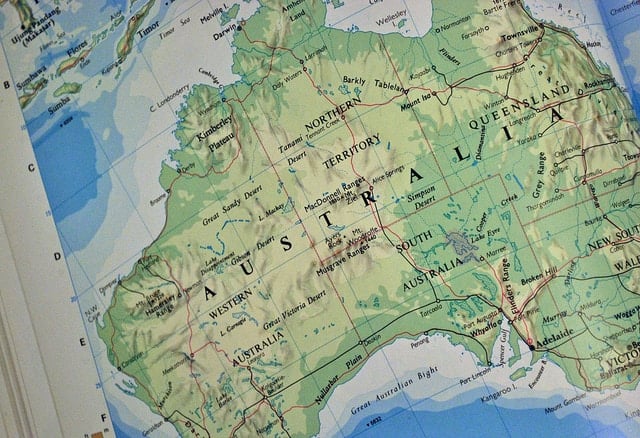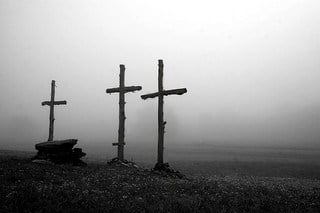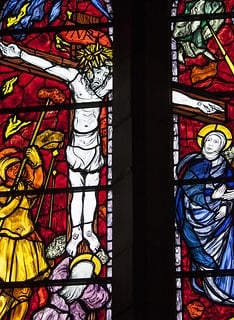In the three months or so since my arrival in this land of the free, I have been boring the locals silly with observations that inevitably begin “in Australia, we…” The cultural divide is much greater than I originally supposed, but in a good way. I am particularly fascinated by the cultural life of American, Catholic young adults. It seems to me that they are remarkably adept at holding together the possibility of faith with the exercise of natural reason. Much more adept than Australian young people who might identify themselves as Catholic on the national census.
During Holy Week, I found myself seated in St Paul’s, Harvard Square, for the celebration of the Passion. I was amazed at the sheer number of young adults in their twenties and early thirties who not only showed up, but were clearly moved by the drama of Good Friday being enacted in our midst. The 700 seat church was full, and the significance of Christ’s suffering and death was plain on the faces of those who surrounded me. This, despite that Good Friday in the U.S. is not a federal holiday, classes were mostly still in session, and few parents were in sight.
Many of these were Harvard undergrads, graduate students, graduates, or else they go to the schools that make Boston the seat of higher learning and secular wisdom that it is. To my visitor’s mind, that meant people who were smart, academic, edgy, critical, modern, and savvy. Exactly the type I might have expected to say that now we live in the modern world, the superstition of religion has had its day. Or, to have faith in God is a really naïve thing to do, because basically there is no evidence for it. Rather, what really counts is being rational, and guess what: Catholicism is about as far from rational science as you can get. Or so I imagined that they might have said.
Yet in this place of the sacred, of beauty, of story, of ritual, and of the aesthetic, I witnessed the rationality of really smart people take a different and surprising track. I saw human reason opened up and extended to the possibility of the transcendent. They seemed to be able to find a way to link the reasoning and thinking of everyday life with the Christian logic of loving sacrifice, understanding rationality and Christianity not as polar opposites, but as two systems that could fit together. And what struck me was their response: gentle moments of peacefulness, reflection, prayer, relationship, and dare I say it, love. It was clear that the story of Christ’s death, enacted again that day, was intensely personal, relevant, and meaningful to them.
Contrast this scenario with a piece that appeared in the Australian press this Easter weekend. It tells the quite typical story of thoughtful young Australians who were raised in a Catholic home, attended Catholic schools, and work for social justice. They have also decided, in conscience, that the practice of Catholic faith is an option not presently for them.
Frances and Bridget Abbott are the daughters of the likely Australian Prime Minister to be, Tony Abbott. Tony is Catholic, and among other things is a graduate of the Sydney Jesuit school, St Ignatius’ College, Riverview, a former Rhodes Scholar, and a one-time seminarian for the Sydney archdiocese. Abbott senior continues to practice his faith, and Bridget suggests that elements of her father’s policies, as well as the family’s worldview, reflect that faith. Yet for the sisters, actively participating in the life of the Catholic community is something that is just not relevant for them in the modern world.
Far from reflecting negatively on Frances and Bridget’s positions, I’d like to suggest that they typify the way in which the vast majority of young Australians raised Catholic view their relationship with the faith. There is a profound ethic of authenticity at work in this generation. Being true to oneself and to one another in conscience is paramount—a moral way of being that is decidedly if implicitly Christian. After all, truth sets us free. And here, this ethic is so powerful as to act upon other personal commitments; powerful enough to become the commitment which frees us from, and overcomes, any original affinity with Catholicism.
Yet in this new way of being, something significant seems to have dropped out. That is, the thing which moved the young people from the Harvard community to be in the pews of St Paul’s this Good Friday is largely missing in the Australian experience. There is a now a wide gap between what confers meaning in the lives of young Aussies raised Catholic, and those of young American Catholics, despite that we share a similar, modern, liberalized culture. So for us Aussies, there is something else going on: something which we need to articulate, and attempt to make sense of. This something else has caused the value of relationship with Christ and the practice of faith to seem not important, meaningful, relevant, or even plausible. And if this is true, it has profound consequences for the future of Australian Catholicism. Actually, if it’s true, it has profound consequences, period; they may just be easier to see from the perspective of immersion in a different culture.
I want to suggest that this something else has its roots in a quite new way of understanding the self, which runs something like: “to be myself is to be independent and self-sufficient.” Seen this way, being true to myself is paramount. The life values which issue from this organizing principle include believing in myself; following first my desires to be happy and personally fulfilled; understanding beliefs as personal and private; respecting not judging others; being good, loving, kind, and equal; helping others where I can; and being true to those who love me.
From this perspective, which I respectfully venture is one shared by the Abbott sisters, it’s easy to see how one very important question arises. It is this: if this way of being works for us, and we are happy, why should God come into it? And this especially if such a God is bundled with a Church that seems to have unending problems, positions, and moral teachings?
If this also is true, then we see a profound shift of perspective worked amongst Australian young people associated with Catholicism. No longer does it seem necessary or relevant to live a life opened up to God, because secular reason (or self-sufficiency) is working perfectly fine for us.
Perhaps we Australians should take this shift as a compliment. Is it that our culture has matured to the extent that we actually live out a highly developed ideal of modernity, where we have actualized Kant’s very idea of religion within the limits of reason alone? If I’m right, belief in the sufficiency of secular reason—that values are now privately defined, freeing others to value what they will—may be our new religion of choice. And that brand of reason is practical, pragmatic, instrumental, independent, and operates within an enclosed system. Faith, or belief in the transcendent, is now purely private, able to be thought of, yet optional in the living out. Is it perhaps that, via self-sufficiency, we have finally transcended the transcendent?
Maybe so. But the one thing this system does not account for is the times when we are not enough. That is, in our humanity, what happens when we stuff it up, when we act out of pride rather than goodness, when we hurt ourselves or others, or when we experience suffering that is not our fault.
This is where the significant logic of suffering, death, and resurrection — once again enacted in that Harvard Square church last Friday — comes in. It operates on a principle learnt from human experience, that when our hearts are broken, they are broken open. That is, when I am hurting, and I am insufficient to fix or heal the hurt by myself, I am opened up to something more than myself. In my vulnerability, I need another’s love, care, and sometimes healing forgiveness.
The suffering, death, and resurrection of Christ at Easter sets out a logic of sacrifice. The Son of God becomes human, his humanity fused with his divinity, and one like me. Knowing my joys but also my suffering and hurt, he actually goes through such suffering and death, undeservingly. Because he is God, Christ takes to himself my insufficiency and inability to heal myself, for me. He prevents me from having to go through the ultimate death, by standing in for me. And in resurrection he demonstrates that death does not have ultimate power. Through this power, loved and cared for, I am healed from those things which hurt, and from which I cannot heal myself.
This is the logic I saw human reason opened up to this Good Friday in Harvard Square. At bottom, it is a logic which requires belief in the transcendent, so could never be explained by recourse to human reason by itself. Yet reason is capable of appreciating our human experience even if it is not fully understood.
I doubt that many of the people I prayed with at St Paul’s arrived with a fully worked out justification for why they came that day. The only certainty is that it can never be that simple. In other terms, there is risk involved, and the starting point is different. Because we don’t have all the answers, we cannot start with some watertight theological framework of certainty. Instead, we can only begin with openness and not cynicism, attention to experience, and willingness to entertain the prospect that the transcendent might be just possible, and even meaningful.
Now I fully realize that for all the American young adults that were in church on Good Friday, there were many more who were not. And many of those who were not may have found the same kind of self-sufficiency I suspect is at work in young Australian Catholics. But what I had not seen before in Australia, which I did see this weekend in Cambridge, Massachusetts, was a large number of smart, accomplished, rational, and Catholic young adults who were opening their ordinary way of thinking and acting to something greater than themselves, and in a quite loving way.
I’ve noticed the difference, but I haven’t yet worked out why it is so. I’ve been taken by surprise, but it’s a surprise that draws me to a desire to know. So for the next two years, I have a new question, and it is this: just what is it that makes possible any reasonable connection between an age-old Christian faith, and life in the deep end of a contemporary, intellectual, and thinking world?
I don’t quite have the answers. But during this my first American Easter, I was reminded that I might start with Pascal, because he holds to something we can at least recognize in ourselves. For each of us, the heart has its reasons that reason does not know. In Harvard Square, and even Down Under.




